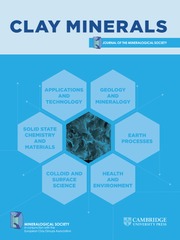Article contents
Formation of hydroxy-interlayer vermiculite (HIV) in rhizosphere soils under German camomile cultivation and manure application
Published online by Cambridge University Press: 27 February 2018
Abstract
This study examines the effect of German camomile (Matricaria camomilla L.) cultivation on the weathering of minerals present in the clay fraction of five different soil series modified or not unmodified (control) with cattle manure. A factorial experiment was performed in a randomized complete block design (RCBD) with three replications. At harvest time the rhizosphere soil was separated from bulk soil and the mineralogy was examined by X-ray diffraction (XRD). Trioctahedral chlorite transformed to hydroxy-interlayer vermiculite (HIV), while kaolinite disappeared. The presence of HIV was identified by an increase in the intensity ratio of the 1.0 and 1.4 nm peaks after Na-citrate pretreatment and K-saturation. It is suggested that Al3+ is released during dissolution of kaolinite and subsequently enters into the interlayer sheet of chlorite, and consequently the brucite layer disappears. This was verified by a significant Mg2+ increase in the soil solution in three out of five experiments at harvest time compared to pre-planting. The pots amended with manure showed the same changes as the pots without manure. The results of this study may explain the presence of unexpected clay minerals in regions with unsuitable conditions for their formation.
- Type
- The 14th George Brown Lecture
- Information
- Copyright
- Copyright © The Mineralogical Society of Great Britain and Ireland 2014
References
- 1
- Cited by


